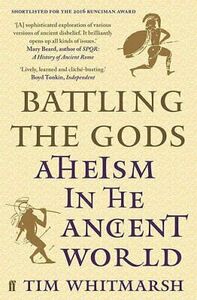Take a photo of a barcode or cover
informative
reflective
slow-paced
informative
slow-paced
informative
informative
slow-paced
Quite hard to get through but seemed a great jumping off point for identifying key thinkers and periods in ancient atheism (whatever that meant relative to their time and culture).
This is an excellent history of a neglected element in Classical thought and culture - atheism and scepticism about the gods in the Greek and Roman world. Whitmarsh not only manages to present an analysis of this subject from Archaic Greece to the Christian emperors of the fourth century, but he also does so in a way that is highly accessible to the general reader. Each period and movement he discusses is presented with enough historical, social and political background for readers to understand the context of the rest of his discussion and analysis and endnotes give excellent guides for further reading on all key points. Whitmarsh takes care to ensure these summaries don't become glib or overgeneralised. And even those who are very familiar with the periods in question benefit from the judicious way he links his story's chapters together. The transition over time from the the vigorous, varied, highly competitive and necessarily self-reliant poleis of Archaic Greece, with their variety of schools of thought, to the far more centralised, monarchical, monotheistic and ideologically restrictive world of the late Roman Empire is made very clear. And this helps the reader understand the changes in thought over this same period.
Given that this is one of the few histories of ancient unbelief and certainly the most accessible on the subject, the way it pulls together all the various atheist, semi-atheist and otherwise sceptical strands in ancient writings and shows how they interconnected is extremely useful. His primary objective - showing that atheism did not spring fully formed from the writers of the Enlightenment and actually has a deep, ancient pedigree - is definitely achieved. But where the book becomes somewhat frustrating and, at times, less than convincing is where Whitmarsh seems to be stretching the evidence to maximise the picture of ancient atheism's extent and impact. Sometimes this is limited to rather too much use of the words "perhaps" or "maybe". Other times it seems the most "atheist" interpretation of evidence is being emphasised over other readings. Whitmarsh is too careful a scholar to fall into pure speculation in the place of analysis, but in places he seems to veer extremely close to it. So the first time he suggested a thinker (e.g. Plato) was merely pretending to believe in the gods to avoid public disapproval I was happy to let that supposition by. After he had done this several times, however, this gambit began to grate. So Lucretius' claim that Epicurus himself was a god gets read as purely figurative and, on the basis of some very ambiguous evidence, Whitmarsh declares that it is "absolutely clear" that the Epicurians were only pretending to condemn atheism because they were secretly atheists themselves. This is unconvincing stuff.
In a similar vein, scepticism about the Olympian gods or even just some wry mockery of the myths related about them gets equated much too closely with full atheism. In several places the reader is assured that sceptics about "the gods" who expressed, despite this, a belief in "the divine" were "really" talking about nature and not anything actually godlike. An increasing tendency to be sceptical about the more conventional, unintellectual conception of the gods and a corresponding move to a conception of a single divine principle -"the One" in Neoplatonism - is arguably a fairly clear progression from the third century BC onward, but that gets downplayed in Whitmarsh's telling. That Roman Christianity both co-opted this tendency and, at the same time, grew out of it is also pretty clear, but this is barely touched on.
So in the final chapters we are told that on the eve of Constantine's conversion atheism had developed to the point that the Roman Empire stood open to the possibility of "a world that left religions behind", yet when the Constantinian emperors combined their new faith with imperial power, atheism did not even register as a threat to them. In all the laws about heresies, pagan sacrifice and belief folded into the Theodosian Code at the close of the fourth century AD, there is not a single one about atheism or anything like it. Whitmarsh says this is because the new order simply could not conceive of such unbelief, but ignores the more obvious alternative explanation - atheism had always been a fringe idea and so was simply not important enough to proscribe.
So this is a highly enjoyable, extremely interesting and very useful book. Even when its arguments seem strained, it remains reasonable if not always wholly convincing. All else aside, it is definitely a book I know I will be returning to many times to consult and re-read, which is always a sign of book that has made a valuable contribution.
Given that this is one of the few histories of ancient unbelief and certainly the most accessible on the subject, the way it pulls together all the various atheist, semi-atheist and otherwise sceptical strands in ancient writings and shows how they interconnected is extremely useful. His primary objective - showing that atheism did not spring fully formed from the writers of the Enlightenment and actually has a deep, ancient pedigree - is definitely achieved. But where the book becomes somewhat frustrating and, at times, less than convincing is where Whitmarsh seems to be stretching the evidence to maximise the picture of ancient atheism's extent and impact. Sometimes this is limited to rather too much use of the words "perhaps" or "maybe". Other times it seems the most "atheist" interpretation of evidence is being emphasised over other readings. Whitmarsh is too careful a scholar to fall into pure speculation in the place of analysis, but in places he seems to veer extremely close to it. So the first time he suggested a thinker (e.g. Plato) was merely pretending to believe in the gods to avoid public disapproval I was happy to let that supposition by. After he had done this several times, however, this gambit began to grate. So Lucretius' claim that Epicurus himself was a god gets read as purely figurative and, on the basis of some very ambiguous evidence, Whitmarsh declares that it is "absolutely clear" that the Epicurians were only pretending to condemn atheism because they were secretly atheists themselves. This is unconvincing stuff.
In a similar vein, scepticism about the Olympian gods or even just some wry mockery of the myths related about them gets equated much too closely with full atheism. In several places the reader is assured that sceptics about "the gods" who expressed, despite this, a belief in "the divine" were "really" talking about nature and not anything actually godlike. An increasing tendency to be sceptical about the more conventional, unintellectual conception of the gods and a corresponding move to a conception of a single divine principle -"the One" in Neoplatonism - is arguably a fairly clear progression from the third century BC onward, but that gets downplayed in Whitmarsh's telling. That Roman Christianity both co-opted this tendency and, at the same time, grew out of it is also pretty clear, but this is barely touched on.
So in the final chapters we are told that on the eve of Constantine's conversion atheism had developed to the point that the Roman Empire stood open to the possibility of "a world that left religions behind", yet when the Constantinian emperors combined their new faith with imperial power, atheism did not even register as a threat to them. In all the laws about heresies, pagan sacrifice and belief folded into the Theodosian Code at the close of the fourth century AD, there is not a single one about atheism or anything like it. Whitmarsh says this is because the new order simply could not conceive of such unbelief, but ignores the more obvious alternative explanation - atheism had always been a fringe idea and so was simply not important enough to proscribe.
So this is a highly enjoyable, extremely interesting and very useful book. Even when its arguments seem strained, it remains reasonable if not always wholly convincing. All else aside, it is definitely a book I know I will be returning to many times to consult and re-read, which is always a sign of book that has made a valuable contribution.
This is definitely an academic book rather than a fun read, but it's very informative and enlightening about the history of Atheism in the western world.
informative
reflective
slow-paced
informative
slow-paced



